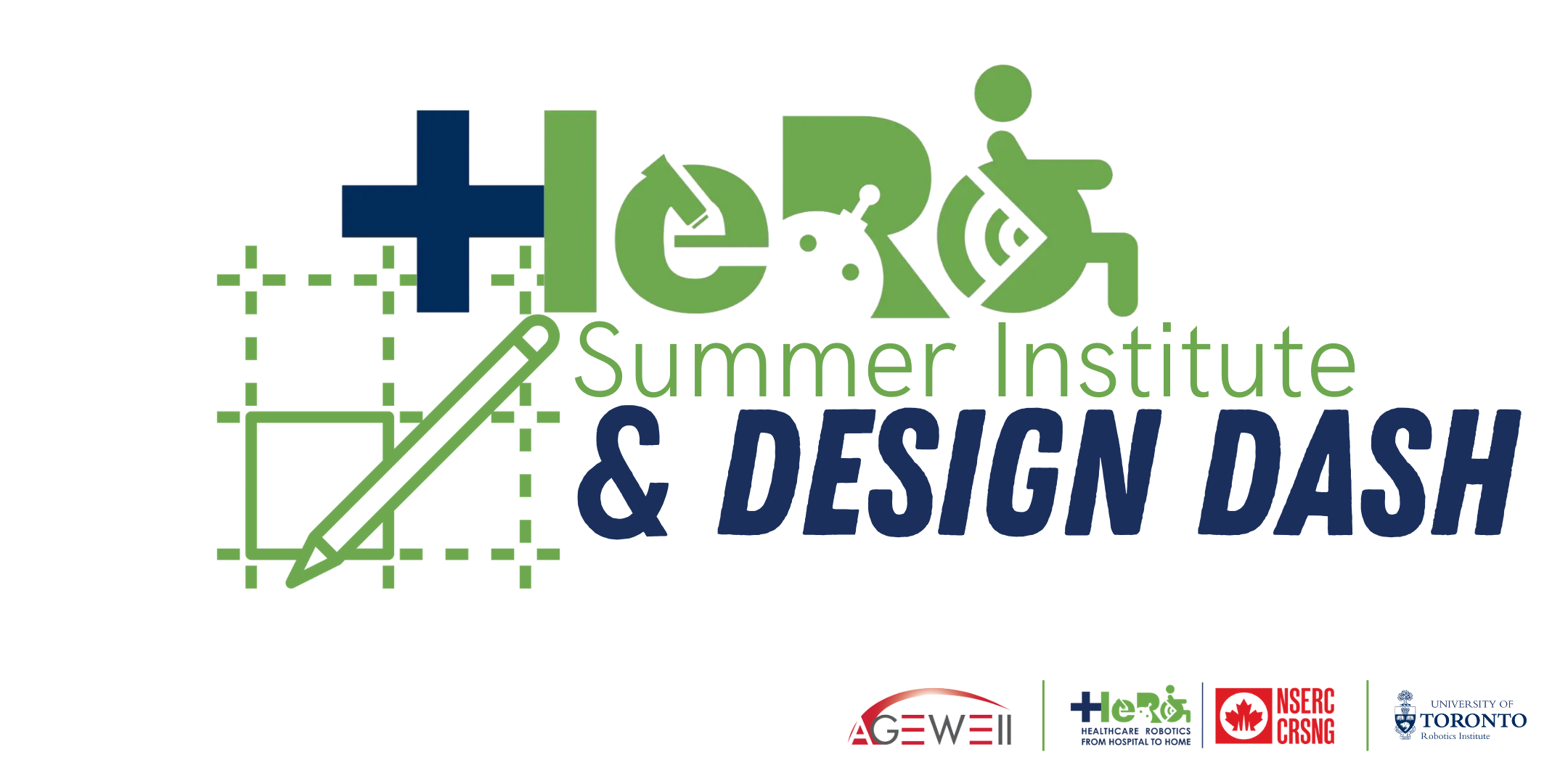
The HeRo Summer Institute challenges emerging researchers to push the boundaries of healthcare robotics research for surgical, assistive, and rehabilitative use. Building on ideas introduced in MIE1080, trainees will work in teams and directly with stakeholders to co-create innovative technologies that will address end user needs.
A project-based, experiential learning opportunity, the HeRo Summer Institute places trainees from different disciplines together and guides them through the solution development process from problem identification to product design and will culminate in a pitch competition.
Attendees will build and demonstrate stakeholder engagement, iterative design, and interdisciplinary working skills and be introduced to key implementation challenges such as commercialization.
The summer institute is aimed at building trainee capacity to:
1. Face the challenges of working in transdisciplinary teams;
2. Engage with stakeholders to identify problems and develop solutions in the identified space;
3. Design practical and innovative solutions that have the potential to make a real-world impact;
4. Explore non-traditional academic knowledge mobilization opportunities such as commercialization;
5. Communicate project potential in a persuasive and engaging manner.
Design Dash Judges
Frank Naccarato, Ph.D., P.Eng.
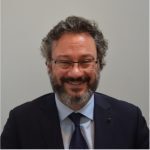
Dr. Naccarato is an inventor, entrepreneur, consultant and professor with over 30 years’ experience in R&D and product development. After completing his doctorate in robotics at the UofT’s Institute for Aerospace Studies, Dr. Naccarato worked as a research engineer, designer, project manager and director of R&D. Past projects include a control algorithm developed for the International Space Station and a robotic testing machine for medical laboratories. He's written business plans, reports, proposals and grant applications that have secured tens of millions in funding, including angel investment and venture capital.
Dr. Naccarato is the founder and president of Quantum Robotic Systems Inc., a robotics startup specializing in stair-climbing devices that allow people to carry heavy items up and down stairs in an easier, faster and safer way.
Professor Xinyu Liu
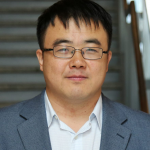
Xinyu Liu is an Associate Professor in the Department of Mechanical and Industrial Engineering. He is developing integrated micro/nanodevices and systems to target a variety of exciting applications in biology, medicine, and environment. Applications of their recent technologies include point-of-care diagnostics, large-scale gene screening, neural basis of behaviour, high-throughput drug screening, and environmental pollution monitoring.
Dr. Patrick Nicholson
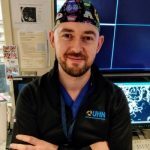
Patrick Nicholson is an Interventional and Diagnostic Neuroradiologist at the University Health Network, as well as an Assistant Professor at UofT's Department of Medical Imaging. Special interests include the endovascular treatment of neurovascular diseases, robotic endovascular surgery and investigation and treatment of disorders of CSF circulation.
He hails from Ireland, where he attended University College Dublin and the Royal College of Surgeons.
Faculty Mentors
Yu Sun, Director of the Robotics Institute and PI of HeRo
Mentors: Eric Diller, Robert Hamilton, Alex Mihailadis, Goldie Nejat, Quentin Peyron, Machiel Van der Loos, Hallie Siegel, Rosalie Wang, Jose Zarriffa
Summer Institute Faculty
Dr. Samantha Sandassie

Dr. Samantha Sandassie is the senior education and training manager at AGE-WELL NCE and has been pivotal in the development of the Early Professionals, Inspired Careers (EPIC) program. At AGE-WELL, she oversees an operational and research team that has trained and funded over 1000 trainees, early career researchers, research staff and entrepreneurs since inception in 2015. An interdisciplinary researcher, Dr. Sandassie's work examines changing policies, educational practices, and the development and impact of formal and informal networks on knowledge translation and implementation. Her current projects revolve around best practices in training engaged and impactful health researchers in AgeTech. She holds a PhD from Queen’s University where she developed and taught courses in intellectual and medical history.
Daniel Southwick

Dan Southwick is a postdoctoral research fellow with Synlab at Ryerson University. He received his PhD from the Faculty of Information at the University of Toronto where I was a resident of the Critical Making Lab. He is currently working on the MeTra project that examines whether AR and VR training environments are as effective as “real-world” ones for medical training.
Gabby Resch
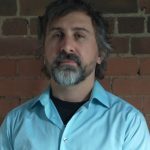
Dr. Gabby Resch is an Assistant Professor in the Faculty of Business and Information Technology at Ontario Tech University. He holds a PhD in information visualization from the University of Toronto, where he worked on physical, embodied, and immersive methods for data representation with the Critical Making Lab. Following this, he was a postdoctoral researcher with the Synaesthetic Media Lab at Ryerson University, where he developed and studied tangible, AR, and VR tools for spatial cognition. His research explores new methods for making sense of data as it moves between physical and digital worlds.
July 5-9 Schedule
(subject to change)
Monday, July 5: Team building and understanding the problem
Learning Goals:
- Strategies for successful transdisciplinary team work
- Introduction to the *topic
- Introduction to the design cycle and tenets of iterative user-centred design
- Create a team contract
10:00-10:30am - Meet and greet/purpose of week, teams announced
10:30-11:15am - Team building activity, introductions
11:30-12:30pm - HeRo Judges Panel - Introduction and criteria for judging teams
12:30-1:30pm - Team working lunch session (bring your own)
2:00-3:00pm - Design cycle refresher + Engaged Stakeholder Research talk
3pm onward - Continued work in teams (teams to arrange for themselves)
Expected Outputs and Homework:
Team:
- Identify working styles and set team parameters for the week & select a problem space, begin initial research
- Identify unmet needs your team might address with their design.
Individual: Brief daily report and reflection on Mural (one post-it minimum per trainee). Trainees are expected to contribute at least one post-it to the Mural board, articulating challenges, knowledge or skills gained, or an achievement.
Tuesday, July 6: Validating Problem & Ideating Solution
Learning Goals:
- Practice user-centred design and stakeholder engagement approaches
- Problem Framing
- Scenario Development
- Persona Development
10:00-10:30 Teams reconvene with 3 identified problems
10:30-12:00 Iterative prototyping session 1
- Within this session, HQP will be introduced to the design cycle and the tools required for paper prototyping. Teams will refine their need and problem statements for a better understanding of the problem space and the solutions being proposed.
1:00-2:00 Whiteboard Challenge, Part 1
- The whiteboard challenge is a short exercise that’s usually used in design interviews or as part of a design team’s process to quickly ideate solutions on a blank whiteboard. This session is a riff on the classic whiteboard challenge. It involves, you – the designers – explaining your thought processes thus far to faculty mentors in order to help solidify your problem selection and ensure that your needs statement accurately reflects the existing market.
Continued work in teams w/ afternoon office hours. Contact Dan or Gabby via Slack to make an office hours appointment. Appointments are for ten minute slots at a time, and are available for individuals or groups as needed.
Expected team outputs and homework for the day:
- Problem/unmet need is selected from identified options
- Begin ideating multiple solutions via iterative prototyping and feedback
- Team Homework: Teams agree which solution to pursue, discuss viability
Individual Homework: Daily Reflection for Tuesday (minimum one post-it)
Wed, July 7: Validating proposed problems & solutions, refine/pivot as needed
Learning Goals:
- Practice user-centred design and stakeholder engagement approaches
- Introduction to business models and challenges of commercialization
- Introduction to knowledge translation techniques beyond the academy
10:00-11:30 Iterative prototyping session 2
HQP will be given the tools to iteratively design their solutions.
1:00-1:30 Whiteboard Challenge, Part 2: Mentors work with teams to validate solutions
- In this part 2 of the whiteboard challenge, you – the designers – will be challenged to select 3 of the solutions from the previous session and, with mentor support, select just 1 solution to pursue. You will need to start thinking about what this solution looks like, how it would be used, and verify that it would meet stakeholder needs.
2:00-3:00 Getting to Market Seminar with Josephine McMurray
- This session will introduce concepts of value propositions and business models. Teams will learn how products and services can reach the market to make an impact on target users including pricing models, distribution, and marketing strategies. Teams will be asked to prepare a business canvas model and consider go-to-market strategies for their proposed solution.
Continued work in teams w/ afternoon office hours (with Dan/Gabby)
Expected team outputs for the day
- Solution selected including addressing technical viability - design lock
- Continued refinement of solutions based on feedback
- Team Homework: Fill out business canvas template, be prepared to start pitch deck
Individual Homework: Daily Reflection for Wednesday (minimum one post-it)
Thursday, July 8: Refining ideas and working on the pitch
Learning Goals:
- Knowledge translation techniques beyond the the academy
- Refining and validating solutions through stakeholder engagement
- Best practices for pitching solutions
10:00-11:00 The Art of the Pitch
- This session will introduce the components of an effective pitch deck, share techniques to develop a strong narrative, and tips on a compelling pitch delivery.
Time for teams to work on pitches
1pm: Polishing solutions and Continued Work in Teams (meetings as needed)
Teams will use this time to continue work on their pitches (both slides and narratives)
2:00-5:00 Individual team mentorship sessions to evaluate refined solutions and pitches (30 min each team)
- Teams will sign up for one of X time slots for a final meeting with mentors/facilitators on the proposed solutions, go-to-market strategy, and pitch.
Expected outputs and homework for the day:
- Solution has been refined
- Team Homework: Pitch deck completed
- Individual Homework: Daily Reflection for Thursday (minimum one post-it)
Friday, July 9: Present pitches and wrap-up
The HeRO Summer Institute experience will culminate in a 5 minute pitch competition where teams will present their solution(s), highlighting its practical value and the business and/or KM plans created during the week.
9:00-10:30 Individual pitch practices
- Teams will sign up for time slots to do a final polishing of their pitches in front of facilitators/mentors.
11:00-12:00 Pitches to judges (5-7 minute pitch per team)
12:00-12:30 Networking/open conversation/break
12:30-1:30 Awards ceremony/closing remarks (Delivered lunch for participants)
Homework: As the HeRo Summer Institute comes to a close, it’s time to reflect on what you’ve learned throughout the week. Final Mural Reflection board: How can you implement what you’ve learned in your home lab or on current projects?
